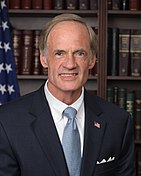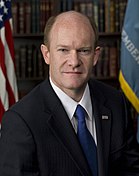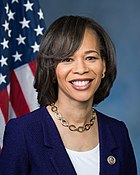United States congressional delegations from Delaware
This is a chronological listing, in timeline format, of the United States Congressional Delegations from Delaware to the United States Senate and United States House of Representatives. U.S Senators are elected by popular vote for a six-year term, beginning January 3. Since 1831, elections in Delaware have been held in the first week of November of the year noted. Before 1914 United States Senators were chosen by the Delaware General Assembly and before 1935 all Congressional terms began March 4.
The dates for the various Congress represent the range of dates they could have been in session, rather than the actual dates of the sessions. Congressional terms began on March 4 through 1933. Since 1935 they have begun on January 3. The juxtaposition of the terms with the sessions is approximate; see the footnotes for actual dates of special appointments, elections, resignations or deaths.
United States Senate
The alternating grey and white boxes indicate the duration of the six-year Senate terms.
| Class 1 Senator | Congress | Class 2 Senator | ||
|---|---|---|---|---|
| George Read (F) | 1st (1789–1791) |
Richard Bassett (F) | ||
| 2nd (1791–1793) | ||||
| 3rd (1793–1795) |
John M. Vining (F)[1] | |||
| Henry Latimer (F) | ||||
| 4th (1795–1797) | ||||
| 5th (1797–1799) | ||||
| Joshua Clayton (F)[2] | ||||
| William H. Wells (F)[3] | ||||
| 6th (1799–1801) |
||||
| Samuel White (F) | 7th (1801–1803) | |||
| 8th (1803–1805) | ||||
| 9th (1805–1807) |
James A. Bayard, Sr. (F) | |||
| 10th (1807–1809) | ||||
| Outerbridge Horsey (F) | 11th (1809–1811) | |||
| 12th (1811–1813) |
||||
| 13th (1813–1815) |
William H. Wells (F) | |||
| 14th (1815–1817) | ||||
| 15th (1817–1819) |
Nicholas Van Dyke (F) | |||
| 16th (1819–1821) | ||||
| Vacant | 17th (1821–1823) | |||
| Caesar A. Rodney (D-R) | ||||
| Vacant | ||||
| 18th (1823–1825) |
||||
| Thomas Clayton (Anti-J) | ||||
| 19th (1825–1827) |
Daniel Rodney (Anti-J) | |||
| Louis McLane (D) | 20th (1827–1829) |
Henry M. Ridgely (D) | ||
| Arnold Naudain (W) | 21st (1829–1831) |
John M. Clayton (W) | ||
| 22nd (1831–1833) | ||||
| 23rd (1833–1835) | ||||
| Richard H. Bayard (W) | 24th (1835–1837) |
|||
| 25th (1837–1839) |
Thomas Clayton (W) | |||
| Vacant | 26th (1839–1841) | |||
| Richard H. Bayard (W) | 27th (1841–1843) |
|||
| 28th (1843–1845) | ||||
| John M. Clayton (W) | 29th (1845–1847) | |||
| 30th (1847–1849) |
Presley Spruance (W) | |||
| John Wales (W) | 31st (1849–1851) | |||
| James A. Bayard, Jr. (D) | 32nd (1851–1853) | |||
| 33rd (1853–1855) |
John M. Clayton (W) | |||
| 34th (1855–1857) |
Joseph P. Comegys (W) | |||
| 35th (1857–1859) |
Martin W. Bates (D) | |||
| 36th (1859–1861) |
Willard Saulsbury, Sr. (D) | |||
| 37th (1861–1863) | ||||
| George R. Riddle (D) | 38th (1863–1865) | |||
| 39th (1865–1867) |
||||
| James A. Bayard, Jr. (D) | 40th (1867–1869) | |||
| Thomas F. Bayard, Sr. (D) | 41st (1869–1871) | |||
| 42nd (1871–1873) |
Eli M. Saulsbury (D) | |||
| 43rd (1873–1875) | ||||
| 44th (1875–1877) | ||||
| 45th (1877–1879) |
||||
| 46th (1879–1881) | ||||
| 47th (1881–1883) | ||||
| 48th (1883–1885) |
||||
| George Gray (D) | 49th (1885–1887) | |||
| 50th (1887–1889) | ||||
| 51st (1889–1891) |
Anthony Higgins (R) | |||
| 52nd (1891–1893) | ||||
| 53rd (1893–1895) | ||||
| 54th (1895–1897) |
Vacant | |||
| 55th (1897–1899) |
Richard R. Kenney (D) | |||
| Vacant | 56th (1899–1901) | |||
| 57th (1901–1903) |
Vacant | |||
| L. Heisler Ball (R) | 58th (1903–1905) |
J. Frank Allee (R) | ||
| Vacant | 59th (1905–1907) | |||
| Henry A. du Pont (R) | ||||
| 60th (1907–1909) |
Harry A. Richardson (R) | |||
| 61st (1909–1911) | ||||
| 62nd (1911–1913) | ||||
| 63rd (1913–1915) |
Willard Saulsbury, Jr. (D) | |||
| 64th (1915–1917) | ||||
| Josiah O. Wolcott (D) | 65th (1917–1919) | |||
| 66th (1919–1921) |
L. Heisler Ball (R) | |||
| T. Coleman du Pont (R) | 67th (1921–1923) | |||
| Thomas F. Bayard, Jr. (D) | 68th (1923–1925) | |||
| 69th (1925–1927) |
T. Coleman du Pont (R) | |||
| 70th (1927–1929) | ||||
| John G. Townsend, Jr. (R) | 71st (1929–1931) |
Daniel O. Hastings (R) | ||
| 72nd (1931–1933) |
||||
| 73rd (1933–1935) | ||||
| 74th (1935–1937) | ||||
| 75th (1937–1939) |
James H. Hughes (D) | |||
| 76th (1939–1941) | ||||
| James M. Tunnell (D) | 77th (1941–1943) | |||
| 78th (1943–1945) |
C. Douglass Buck (R) | |||
| 79th (1945–1947) | ||||
| John J. Williams (R) | 80th (1947–1949) | |||
| 81st (1949–1951) |
J. Allen Frear, Jr. (D) | |||
| 82nd (1951–1953) | ||||
| 83rd (1953–1955) | ||||
| 84th (1955–1957) |
||||
| 85th (1957–1959) | ||||
| 86th (1959–1961) | ||||
| 87th (1961–1963) |
J. Caleb Boggs (R) | |||
| 88th (1963–1965) | ||||
| 89th (1965–1967) | ||||
| 90th (1967–1969) |
||||
| 91st (1969–1971) | ||||
| William V. Roth, Jr. (R) | 92nd (1971–1973) | |||
| 93rd (1973–1975) |
Joe Biden (D)[4] | |||
| 94th (1975–1977) | ||||
| 95th (1977–1979) | ||||
| 96th (1979–1981) |
||||
| 97th (1981–1983) | ||||
| 98th (1983–1985) | ||||
| 99th (1985–1987) |
||||
| 100th (1987–1989) | ||||
| 101st (1989–1991) | ||||
| 102nd (1991–1993) |
||||
| 103rd (1993–1995) | ||||
| 104th (1995–1997) | ||||
| 105th (1997–1999) |
||||
| 106th (1999–2001) | ||||
| Tom Carper (D) | 107th (2001–2003) | |||
| 108th (2003–2005) |
||||
| 109th (2005–2007) | ||||
| 110th (2007–2009) | ||||
| 111th (2009–2011) |
||||
| Ted Kaufman (D) | ||||
| Chris Coons (D) | ||||
| 112th (2011–2013) |
||||
| 113th (2013–2015) | ||||
| 114th (2015–2017) |
||||
| 115th (2017–2019) | ||||
| 116th (2019–2021) | ||||
United States House of Representatives
U.S Representatives are elected by popular vote for a two-year term, beginning January 3. Since 1831, Delaware elections have been held the first week of November of the year noted. Before 1831, elections were held in October and before 1935 all Congressional terms began March 4.
In Delaware all representatives have been elected from the state at large, rather than by district. There has always been the minimum one representative, except for the Thirteenth through Seventeenth Congress (1813–1823), when there were two representatives.
| Congress | Representative (at large) | |
|---|---|---|
| 1st (1789–1791) |
John M. Vining (Pro-Admin) | |
| 2nd (1791–1793) | ||
| 3rd (1793–1795) |
John Patten (Anti-Admin)[5] | |
| Henry Latimer (F)[6][7] | ||
| 4th (1795–1797) |
John Patten (D-R) | |
| 5th (1797–1799) |
James A. Bayard, Sr. (F) | |
| 6th (1799–1801) | ||
| 7th (1801–1803) | ||
| 8th (1803–1805) |
Caesar A. Rodney (D-R) | |
| 9th (1805–1807) |
James M. Broom (F)[8] | |
| 10th (1807–1809) |
Nicholas Van Dyke (F)[9] | |
| 11th (1809–1811) | ||
| 12th (1811–1813) |
Henry M. Ridgely (F) | |
| Congress | Representative (at large) |
Representative (at large) |
| 13th (1813–1815) |
Henry M. Ridgely (F) | Thomas Cooper (F) |
| 14th (1815–1817) |
Thomas Clayton (F) | |
| 15th (1817–1819) |
Louis McLane (F) | Willard Hall (D-R)[10] |
| 16th (1819–1821) | ||
| 17th (1821–1823) |
Caesar A. Rodney (D-R)[11] | |
| Daniel Rodney (F) [12] | ||
| Congress | Representative (at large) | |
| 18th (1823–1825) |
Louis McLane (F)[13] | |
| 19th (1825–1827) | ||
| 20th (1827–1829) |
Kensey Johns, Jr. (F)[14] | |
| 21st (1829–1831) | ||
| 22nd (1831–1833) |
John J. Milligan (W) | |
| 23rd (1833–1835) | ||
| 24th (1835–1837) | ||
| 25th (1837–1839) | ||
| 26th (1839–1841) |
Thomas Robinson, Jr. (D) | |
| 27th (1841–1843) |
George B. Rodney (W) | |
| 28th (1843–1845) | ||
| 29th (1845–1847) |
John W. Houston (W) | |
| 30th (1847–1849) | ||
| 31st (1849–1851) | ||
| 32nd (1851–1853) |
George R. Riddle (D) | |
| 33rd (1853–1855) | ||
| 34th (1855–1857) |
Elisha D. Cullen (K-N) | |
| 35th (1857–1859) |
William G. Whiteley (D) | |
| 36th (1859–1861) | ||
| 37th (1861–1863) |
George P. Fisher (U) | |
| 38th (1863–1865) |
William Temple (D)[15] | |
| Nathaniel B. Smithers (UU)[16] | ||
| 39th (1865–1867) |
John A. Nicholson (D) | |
| 40th (1867–1869) | ||
| 41st (1869–1871) |
Benjamin T. Biggs (D) | |
| 42nd (1871–1873) | ||
| 43rd (1873–1875) |
James R. Lofland (R) | |
| 44th (1875–1877) |
James Williams (D) | |
| 45th (1877–1879) | ||
| 46th (1879–1881) |
Edward L. Martin (D) | |
| 47th (1881–1883) | ||
| 48th (1883–1885) |
Charles B. Lore (D) | |
| 49th (1885–1887) | ||
| 50th (1887–1889) |
John B. Penington (D) | |
| 51st (1889–1891) | ||
| 52nd (1891–1893) |
John W. Causey (D) | |
| 53rd (1893–1895) | ||
| 54th (1895–1897) |
Jonathan S. Willis (R) | |
| 55th (1897–1899) |
L. Irving Handy (D) | |
| 56th (1899–1901) |
John H. Hoffecker (R)[17] | |
| Walter O. Hoffecker (R)[18] | ||
| 57th (1901–1903) |
L. Heisler Ball (R)[19] | |
| 58th (1903–1905) |
Henry A. Houston (D) | |
| 59th (1905–1907) |
Hiram R. Burton (R) | |
| 60th (1907–1909) | ||
| 61st (1909–1911) |
William H. Heald (R) | |
| 62nd (1911–1913) | ||
| 63rd (1913–1915) |
Franklin Brockson (D) | |
| 64th (1915–1917) |
Thomas W. Miller (R) | |
| 65th (1917–1919) |
Albert F. Polk (D) | |
| 66th (1919–1921) |
Caleb R. Layton (R) | |
| 67th (1921–1923) | ||
| 68th (1923–1925) |
William H. Boyce (D) | |
| 69th (1925–1927) |
Robert G. Houston (R) | |
| 70th (1927–1929) | ||
| 71st (1929–1931) | ||
| 72nd (1931–1933) | ||
| 73rd (1933–1935) |
Wilbur L. Adams (D) | |
| 74th (1935–1937) |
J. George Stewart (R) | |
| 75th (1937–1939) |
William F. Allen (D) | |
| 76th (1939–1941) |
George S. Williams (R) | |
| 77th (1941–1943) |
Philip A. Traynor (D) | |
| 78th (1943–1945) |
Earle D. Willey (R) | |
| 79th (1945–1947) |
Philip A. Traynor (D) | |
| 80th (1947–1949) |
J. Caleb Boggs (R) | |
| 81st (1949–1951) | ||
| 82nd (1951–1953) | ||
| 83rd (1953–1955) |
Herbert B. Warburton (R) | |
| 84th (1955–1957) |
Harris B. McDowell, Jr. (D) | |
| 85th (1957–1959) |
Harry G. Haskell, Jr. (R) | |
| 86th (1959–1961) |
Harris B. McDowell, Jr. (D) | |
| 87th (1961–1963) | ||
| 88th (1963–1965) | ||
| 89th (1965–1967) | ||
| 90th (1967–1969) |
William V. Roth, Jr. (R)[20] | |
| 91st (1969–1971) | ||
| 92nd (1971–1973) |
Pierre S. du Pont, IV (R) | |
| 93rd (1973–1975) | ||
| 94th (1975–1977) | ||
| 95th (1977–1979) |
Thomas B. Evans, Jr. (R) | |
| 96th (1979–1981) | ||
| 97th (1981–1983) | ||
| 98th (1983–1985) |
Thomas R. Carper (D) | |
| 99th (1985–1987) | ||
| 100th (1987–1989) | ||
| 101st (1989–1991) | ||
| 102nd (1991–1993) | ||
| 103rd (1993–1995) |
Michael N. Castle (R) | |
| 104th (1995–1997) | ||
| 105th (1997–1999) | ||
| 106th (1999–2001) | ||
| 107th (2001–2003) | ||
| 108th (2003–2005) | ||
| 109th (2005–2007) | ||
| 110th (2007–2009) | ||
| 111th (2009–2011) | ||
| 112th (2011–2013) |
John C. Carney, Jr. (D) | |
| 113th (2013–2015) | ||
| 114th (2015–2017) | ||
| 115th (2017–2019) |
Lisa Blunt Rochester (D) | |
| 116th (2019–2021) |
Key
References
- Barone, Michael & Richard E. Cohen (2005). The Almanac of American Politics. Washington: National Journal Group. ISBN 0-89234-112-2.
- ^ Resigned January 19, 1798
- ^ Elected to fill vacancy left by Vining's resignation, died August 11, 1798
- ^ Elected to fill vacancy left by Clayton's death
- ^ Resigned upon being elected Vice-President
- ^ contested election, served until February 14, 1794, when a successor was selected.
- ^ successfully contested election of John Patten, seated February 14, 1794.
- ^ resigned February 7, 1795 to become U.S. Senator.
- ^ resigned October 6, 1807, before Tenth Congress assembled.
- ^ elected to fill vacancy caused by the resignation of James M. Broom, seated December 2, 1807.
- ^ resigned January 22, 1821.
- ^ resigned January 24, 1822 to become U.S. Senator.
- ^ elected to fill vacancy caused by the resignation of Caesar A. Rodney, seated December 2, 1822.
- ^ resigned March 3, 1827 to become U.S. Senator.
- ^ elected to fill vacancy caused by the resignation of Louis McLane in the preceding Congress, seated December 3, 1827.
- ^ died May 28, 1863, before Congress assembled.
- ^ elected to fill vacancy caused by the death of William Temple, seated December 7, 1863.
- ^ died June 16, 1900.
- ^ elected to fill vacancy caused by the death of John H. Hoffecker, seated December 3, 1900.
- ^ resigned March 3, 1903, to become U.S. Senator.
- ^ resigned December 31, 1970 to become U.S. Senator.



